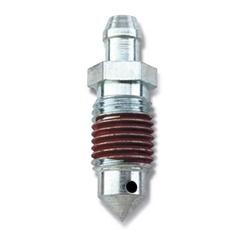Can you tell me what solvent would work best?
Don't know if it is "best", but I was told to use methanol (aka wood alcohol) many years ago. When I did my former TR3A (back around 1985 or so), I was able to buy a bottle of methanol at the local drug store; but had to ask the pharmacist for it and explain why I wanted it. Not sure if that is still the case today or not. The stuff is fairly poisonous (1/4 cup is usually fatal, lower doses can cause blindness), so treat it with respect, try to avoid getting it on your skin and so on. If you do get it on you, be sure to wash immediately. Probably any commercial "brake cleaner" would work just as well (but many of them are mostly methanol anyway so the same precautions apply).
The solvent is only for the lines, I wouldn't run it through the calipers & cylinders unless you plan to then disassemble them. Of course the lines have to be dried thoroughly afterwards. As John said, you sure don't want any liquid alcohol left in the system when you are done, not even a drop.
also do I need a vacuum bleeder system?
I've never had any luck with using vacuum bleeders, so I'd say it is certainly not required. Usually I've been able to bribe the wife or a neighborhood kid into helping me do it the old fashioned way (open the valve, push the pedal, close the valve, release the pedal). Last time around though (when assembling the TR3), I bought some speed bleeders for the rear wheels and gravity bled the front calipers. Worked out well and even with a trip to FLAPS for the bleeders, I had the brakes together and working before the wife got home. Sorry, I don't recall the size offhand, but here's a shot just to show what I mean
https://www.summitracing.com/parts/rus-639530

 Hey there Guest!
Hey there Guest!
 smilie in place of the real @
smilie in place of the real @
 Pretty Please - add it to our Events forum(s) and add to the calendar! >>
Pretty Please - add it to our Events forum(s) and add to the calendar! >> 



 A friendly reminder - be careful what links you click on here. If a link is posted by someone you don't know, or the URL looks fishy, DON'T CLICK. Spammers sometimes post links that lead to sites that can infect your computer, so be mindful what you click.
A friendly reminder - be careful what links you click on here. If a link is posted by someone you don't know, or the URL looks fishy, DON'T CLICK. Spammers sometimes post links that lead to sites that can infect your computer, so be mindful what you click.